Mammoth (Dawn of Mammals Book 5) Read online
Page 15
“I predict Ted will get it in less than a day. Me, I could stay inside for three weeks easily if I had a good book.”
“We don’t have a bad one, even.”
“No. We could play games or tell stories to keep ourselves amused.”
“What about crafts, like knife-making?”
“I hope we won’t need to make anything more. Next jump, we’re going home. Or as close as Laina can get us.”
“Home,” he said, wistful. “Do you think we’ll really make it?”
“I’m sure everybody will ask Laina that a hundred times in the next three weeks. So you’ll hear her answer several times, and she’s the expert.”
“It’s kind of scary.”
“Why’s that?”
“It will seem so different. And all those people. I don’t know if I’ll be able to stand something like a concert or hockey game, with a thousand or ten thousand people all jammed together.”
“I suspect you’ll readjust.”
“I hope some things don’t change when we’re back.”
“You mean you and Jodi? I think you’re safe on that front. She nearly killed me getting back here to you quickly.”
“Really?”
“Really, Zach. She’s crazy about you.”
“Okay,” he said, and he relaxed with a sigh.
Chapter 18
Three days later, the others returned, tired, but dragging plenty of meat. They had seen no sign of the tiger or any other animal.
With each passing day, Hannah saw more and more signs of anxiety among the others. Confinement in the cabin seemed to make it worse, so Claire assigned work teams. People ranged out to gather fuel. Others were assigned what Claire called defensive guard duty, walking in a circle about a mile from the igloo, checking for predator tracks. Claire fished some days despite never catching a single fish. Hannah suspected she needed the privacy. She let the hole at the site of the timegate heal over in the ice and cracked open a new one farther away from the igloo.
As Hannah had predicted to Zach, Laina was quizzed often about how close she could get them. She said, “No guarantees.” When pressed in private, she told Hannah that she thought she could land them within a thousand years, two thousand off at the worst. That was quite a range, from the year 0 to the year 4000. But Laina also didn’t know if they could bypass the day they’d left and land in the future. “Physics might not allow for it.” When Hannah asked her why, the explanation went over Hannah’s head.
By their final week in the ice age, everyone was sick of mammoth meat, which wasn’t at all the tastiest meat they had eaten on their journeys. But it had kept them alive, and Hannah never forgot how lucky they had been to find it—and to acquire it without loss of human life.
Also by the final week, everyone was smelling pretty ripe. It was too cold to bathe, and to heat water enough for even a sponge bath of crotch and pits for everyone would have taken hours of gathering fuel and heating water. The braver among them soaked a rag in cold water and used that, but no one, not even the most fastidious, did that every day. Their clothes were filthy too. Under the hide capes, they looked and smelled like a camp of homeless people, with crusty clothes and matted hair.
Zach continued to grow stronger. His wrist was fine after so many days of resting it. Nari still couldn’t reach her bad arm overhead all the way, but her limp grew less pronounced. Of all Hannah’s patients, only Bob worried her. He was not getting better, was still low-energy and, when she cornered him and demanded a report, admitted to a constant ache in his chest.
Bob’s beard was thicker, and Ted’s was filling in. Zach had a much lighter beard and Rex none at all. Nari gave everyone haircuts one day with a stone knife, more for something to do than because it was necessary. Hannah declined the offer and kept her greasy hair pulled back with a rawhide tie. Wherever they landed, she hoped it had warmer water so she could bathe and wash her hair first thing.
The last week, they debated whether to take everything they owned or leave some things behind.
“If we don’t land where we want, or if it’s dangerous somehow,” Laina said, “we might want to jump back and try again.”
“Dangerous how?” Nari said.
“Like a nuclear war and there’s fallout,” Dixie said.
Bob said, “Not that we’d be able to know if there was radiation. It’s odorless and invisible.”
“And we’d be stuck with it a month anyway, right?” Ted said to Laina.
“Whatever we land in, we’re stuck with it a month. So it’s best to take everything that still works. We might need it where we land, and we might need to jump back with it.”
“The rope is pretty much done in.”
“If there’s grass where we’re going, we can weave more.”
“There should be,” Bob said. “We lived in an interglacial, and that should hold for several thousand years on either side of our time.”
“It will still be winter, won’t it?” Claire said. “So we might not have grass flexible enough to make rope with.”
“What about global warming?” Nari said. “If we land forward of our time, it could be hotter, right?”
“Yes, but no one predicted the future would ever become as hot as the Paleocene or Eocene were. We survived them,” Bob said. “So I’m not worried about that.”
It was decided: they’d take everything with them, including whatever mammoth meat was left over, frozen chunks of it. They didn’t have the wood to smoke it, but wherever they landed, either it’d either be cold enough to keep the meat frozen or warm enough that trees would be available to smoke it and keep it from spoiling.
From what had happened so far, they thought it likely would be December of whatever year they jumped into, but just because the year had progressed for them in a normal fashion so far did not mean it would continue to. That it had for Laina too, each jump progressing her through the seasons she had survived, had Hannah convinced. December it would be.
The last few days of anticipation were the hardest to bear. Claire made them work hard—even if it was just busy work sometimes—to keep tempers from flaring, but they did flare anyway. It came from nervousness, hope, despair, fear, all the emotions cycling around. Jodi and Zach had a spat. Bob spent a lot of time playing peacemaker, probably something he was used to from teaching.
The last few days became the last day, and then the last few hours. They were ready in plenty of time. Enough rope had been repaired that they were roped together in teams of two, just in case they landed in water or on a steep slope again, with plenty of slack in the rope.
Hannah had pulled out the GPS unit and had it clipped to her belt. The battery was almost dead, but not quite. She made a mental note to write the manufacturer to praise them for how long it had lasted without draining if they made it back to their original time. Her cellphone battery, even if she didn’t use it at all, would drain in eight or nine days. Of course, from what Laina had told her, the chances of appearing at a time when the battery manufacturer actually existed were tiny.
The hours became minutes, and the minutes passed so slowly, Hannah nearly asked Laina for her watch back so that she could make sure time was still moving forward.
But eventually, it happened. The timegate appeared, the shimmering light over the lake, in late afternoon, just when Laina had said it would.
Some of them had crossed fingers. Some had closed eyes and were no doubt praying. Everyone wanted to go home. Hannah would be happy to hit any time with medical care for Bob. That was her main concern. Her old job, old friends, estranged family: none of that mattered as much as her new family, these people right here with her. She hoped for arriving the year they had left for the others’ sakes. But she’d take a time with reliable pharmaceuticals, for Bob’s sake.
Ted passed through first, the remaining spears in hand. “Good luck!” Nari called to him.
“Good luck to us all,” Bob said. He was next. He disappeared, and Rex went next. The four youn
g women passed through. Zach trailed Jodi, strong enough now to be carrying the huge mammoth hide on his own. Hannah trailed Zach. Behind her, Laina brought up the rear, carrying her old hides and animal traps.
The jolt of electricity hit Hannah, the swirling purple surrounded her, and she was falling again.
Chapter 19
It was dark. The first time they’d jumped they had landed at night, and now they had again. Of course, Laina must have done so several times in so many years of travel. No hill or lake or cave appeared this time though. When Hannah flipped on her flashlight, she saw they had landed in snow.
“Is this normal weather for our original time?” she asked no one in particular.
“If it’s December,” Ted said, “the weather could be anything. Snow, blizzard, no days over freezing all month, or a hot wind that makes it sixty-five degrees for three days.”
“The snow’s not very deep,” Jodi said.
“The GPS,” Nari said. “What does it say, Hannah?”
Hannah took it off her belt and flipped it on. She watched as it searched for satellites. “Searching…” it said. And it kept saying that. And kept saying that.
She waited a full minute, but she knew it should have found something in half that time. She flipped it off. “Nothing, guys. I’m sorry.”
“It doesn’t mean anything, does it?” Dixie asked. “I mean, maybe they’re there but you aren’t getting anything.”
Rex said, “No, it means something. The sky is loaded with them. Anywhere on earth you should get two. Two’s enough to make that work perfectly. But even one, it’d tell you, right?”
“It would,” Hannah said. She’d already flipped the device off. “It might have another minute of juice left,” she said. “I guess we should hang on to that for the future.”
“When was GPS invented?” Jodi said. “Mr. O’Brien?”
“I think it was around for military use my whole life, but only public access after 2000 or so,” he said. “It’s pretty cold here.”
“We have hides,” Laina said. “Let’s get set up for the night, however much more there is of it.”
“The stars are right,” Rex said. “That’s something.”
“Are they?” Claire asked. The feeling of disappointment at the lack of a GPS signal had been palpable, but this news put a note of hope into her voice.
“Yeah, that’s Lyra, almost right overhead,” he said, pointing. “It’s that little parallelogram. Bright star set off just a bit from that shape is Vega, Alpha Lyrae, fifth brightest star we can see.” He made an amused noise. “I’m surprised I remember all that. Not like I’ve been using it lately.”
“So we have to be close to home,” Claire said.
“No GPS satellites,” Rex said.
Laina said, “Within two thousand years, like I said.”
“I’m no-fooling cold,” Dixie said. “Can I climb under some hides?”
“We all should,” Bob said.
In the light of the solar flashlight, they arranged themselves on the ground, the mammoth hide underneath them, and all the other hides piled on top.
“Sleep if you can,” Bob said.
“I couldn’t possibly,” Jodi said.
“We’ll need to explore tomorrow. Not just the usual stuff, either,” Bob said. “We need to find out when we landed. So we’ll be walking plenty, or you guys all will be.”
“If we can find out,” Laina said. “There’s no guarantee of that.”
“If we can,” Bob agreed.
It took a half-hour for them to settle down into silence. There was a lot of fidgeting. Hannah surprised herself by falling asleep. She woke because of the chatter among the others. The twilight that preceded dawn was just starting. Hannah stood and stretched, looking for a place to relieve herself. There was a rock wall there. They were in a canyon.
Wait. They were in the same canyon.
The very same canyon where they’d been hunting fossils when this all started. That was where they had landed. Hannah recognized the spot where M.J. had been standing, explaining about the fossil that had been taken out. The heavy one that had seemed such a burden on the hike out. She’d carried more weight than that in the past six months.
When the sky grew brighter, she’d go up there and check out the spot. If she could find a bit of that fossil poking out, they were before the time they left. Wait, no. She didn’t have to do that. The cliff was as it was, before the rock fall. Not broken.
Early. They’d arrived early. Considering the lack of GPS signal and what Bob had said, before 2000. Maybe even before the first communications satellites, whenever they’d gone up. 1970? She stared at the sky, which was clear of clouds now, looking for fast-moving lights. From many years of backpacking and camping, she knew that satellites were more visible at dawn and dusk. Something about the angle of the light, an ex-boyfriend had told her, and for all she knew, he had been right. But though she stared for a long time, until the light grew so much that even the brightest star was fading, there was nothing moving up there.
She went off to relieve herself in private, wondering if she should say anything. Stupid. Of course she should say something.
She finished what she was doing, thinking, Oh let it be a time of toilet paper, at least. Or any paper. Newspapers would do. What was it pioneers used? Corncobs, she’d once heard. Still an improvement over leaves or grass or snow.
She waited until everyone was up to tell them what she’d deduced. “It’s before 1970,” she said. “And probably before 1960.” She explained why she thought so.
“Satellites,” Rex said. “Great idea, to look for them.”
“But you just looked once,” Dixie said.
“True. We can all look tonight at dusk.”
Bob was staring at the cliff where the timegate was. “Why didn’t we appear right in the rock, I wonder?”
“I’m glad we didn’t,” Zach said.
“The field must extend beyond the rock, at least for a little ways,” Bob said.
“We were lucky it did.”
“Or maybe there’s a rule,” Laina said. “Density of matter or something.”
“So we’re not home,” Jodi said.
“No, I’m afraid not,” Bob said. “I want to be there too. But we don’t know yet where we are. The year 200? 1000? 1900? I’d like to know.”
“We need to know,” Hannah said. “If we’re close to our time, there are doctors and medicines. If not, we’re probably no better off than we would be if we were ten thousand years off.”
“I wonder if the plants are the same as our time.”
“Probably,” Claire said. “But if we didn’t know the plants before, which ones can be used as food and medicine, we’re also no better off for that.”
“Should have studied that, I guess,” said Zach. “Back when I was fourteen or something. Instead of playing video games.”
“What should we do first today?” Claire asked. “I’m open to suggestions.”
“I want to look for the hiking trail,” Hannah said. “If it’s there, we’re close. The park was established in 1966, but amateurs and scientists were collecting fossils before that and they might have worn an obvious footpath.”
“Okay. It’ll be hard to see under the snow, but we’ll look for that and reconnoiter in general. Find a high spot. Anybody disagree with that? No? Let’s take only what we need. Water, mostly. We’ll eat something now and then bury the meat in a snow bank. I don’t think a scavenger will sniff it out,” Claire said.
In another forty minutes, they had their campsite tidied up, the meat buried, and rocks pinning down any gear they didn’t want to blow away. Zach felt good enough to hike. Bob and Nari insisted on walking along with the others for a time. “We’ll turn back the instant either of us gets tired.”
Claire said, “Or when Hannah tells you to.”
“Yes, ma’am,” Bob said.
A few minutes later, they thought they were standing on the flat spot where Jod
i had found the ground squirrel fossil. The snow wasn’t very deep, maybe four inches with a few deeper snowdrifts blown up against rocks or bushes.
“It seems like a hundred years ago we went on that field trip,” Jodi said.
“It might be a hundred years in the future,” Rex said.
Jodi said, “So if I dug down to it today and took that little fossil out, would the past change, Laina? I wouldn’t find it on the field trip if I took it now. Would our memories change? What if I wrote a note to myself that all this had happened? Would the writing disappear when I dug the fossil out?”
“I don’t know about those kinds of rules,” Laina said. “I only know the math. And about what I experienced, which I’ve already told you.”
They kept to the same basic route of the trail that Hannah remembered from several trips in and out, but there was no sign that anything, not even wildlife, had carved a similar path. If there was a path, evidence of it was hidden under the snow.
An hour later, Claire stopped at another flat spot. “Isn’t this where the parking lot was?”
“Maybe,” Bob said. He was breathing hard.
“Everybody take fifteen,” Hannah said. “Nari, how’s your leg?”
“Okay,” Nari said. “I can walk more, I think.”
“Uhuh,” Hannah said. “Don’t forget you’ll have to walk back too.” She’d give them both fifteen minutes to rest. She knew they were excited about the possibilities of where—when—they had landed. So was she. But discovering it firsthand wasn’t worth pushing them to the point of further injury.
Claire pulled Hannah aside. “I’ll send them back. Just tell me if you want me to.”
“Probably would be wisest. Or let them wait here for us. It’s higher than the canyon where the timegate is, and if we get lost, we’ll be able to spot them more easily.”
“There’s scrub here. They could build a fire. We could all return to a meal of hot meat.”
“Whatever you think best. But yeah, I think they should stop for the day.”
Bob called, “I know you two are talking about me.”
“Men,” Hannah said in mock exasperation. “You always think you’re the topic of every conversation.”

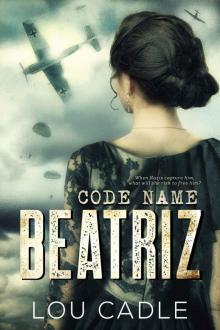 Code Name- Beatriz
Code Name- Beatriz Oil Apocalypse Collection
Oil Apocalypse Collection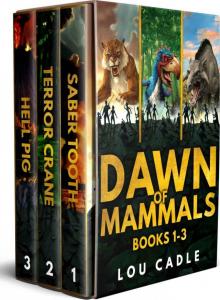 A Dawn of Mammals Collection
A Dawn of Mammals Collection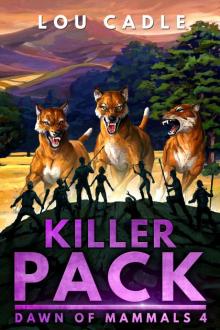 Killer Pack (Dawn of Mammals Book 4)
Killer Pack (Dawn of Mammals Book 4)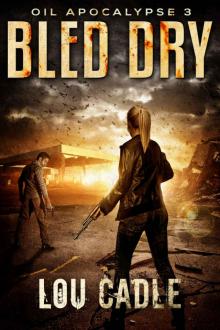 Bled Dry
Bled Dry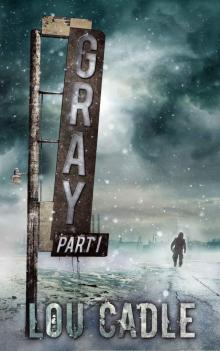 Gray (Book 1)
Gray (Book 1) Dawn of Mammals (Book 4): Killer Pack
Dawn of Mammals (Book 4): Killer Pack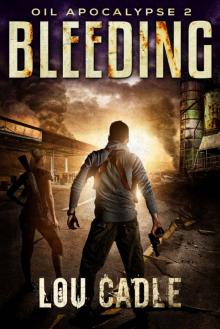 Bleeding (Oil Apocalypse Book 2)
Bleeding (Oil Apocalypse Book 2)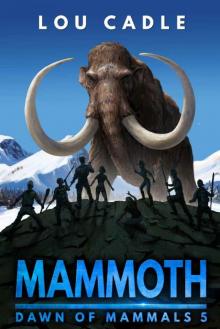 Dawn of Mammals (Book 5): Mammoth
Dawn of Mammals (Book 5): Mammoth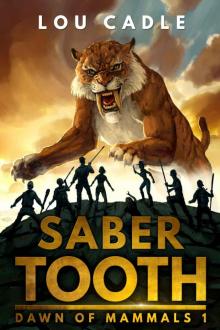 Saber Tooth (Dawn of Mammals Book 1)
Saber Tooth (Dawn of Mammals Book 1)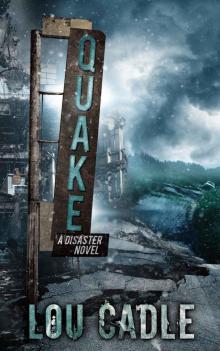 Natural Disaster (Book 2): Quake
Natural Disaster (Book 2): Quake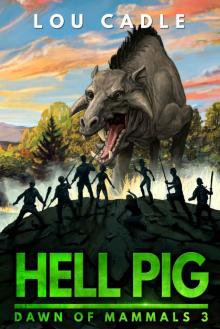 Hell Pig (Dawn of Mammals Book 3)
Hell Pig (Dawn of Mammals Book 3)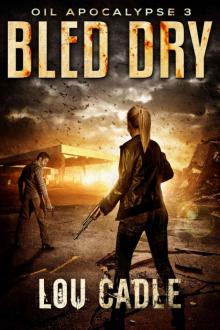 Bled Dry (Oil Apocalypse Book 3)
Bled Dry (Oil Apocalypse Book 3)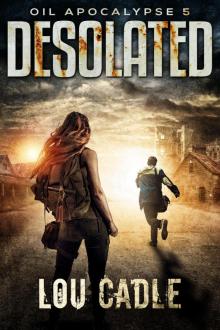 Desolated
Desolated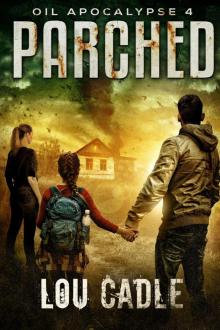 Parched
Parched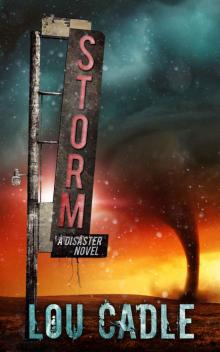 Natural Disaster (Book 3): Storm
Natural Disaster (Book 3): Storm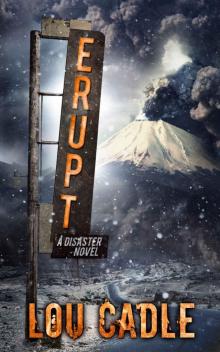 Natural Disaster (Book 1): Erupt
Natural Disaster (Book 1): Erupt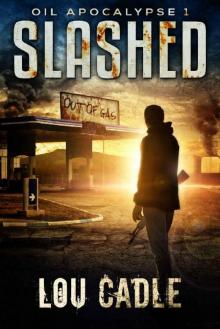 Slashed (Oil Apocalypse Book 1)
Slashed (Oil Apocalypse Book 1)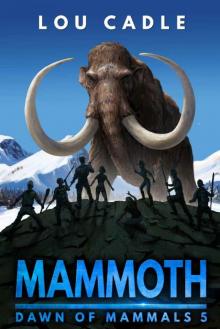 Mammoth (Dawn of Mammals Book 5)
Mammoth (Dawn of Mammals Book 5)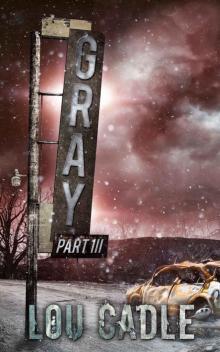 Gray (Book 3)
Gray (Book 3)